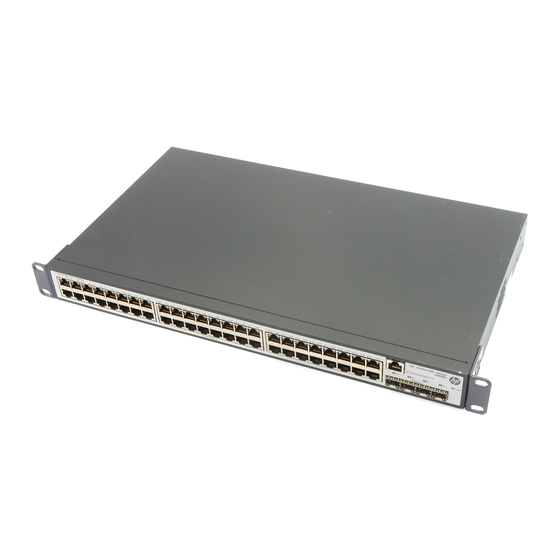HP 1910-8G Информационный лист - Страница 2
Просмотреть онлайн или скачать pdf Информационный лист для Переключатель HP 1910-8G. HP 1910-8G 16 страниц. 1910 switch series
Также для HP 1910-8G: Quickspecs (43 страниц), Quickspecs (44 страниц)

Features and benefits
Management
• Simple Web management
allows for easy management of the switch—even by nontechnical
users—through an intuitive Web GUI; supports HTTP and HTTP
Secure (HTTPS)
• Single IP management
enables management of up to four HP 1910 devices using a single
Web interface; simplifies management of multiple devices
• Secure Web GUI
provides a secure, easy-to-use graphical interface for configuring
the module via HTTPS
• SNMPv1, v2c, and v3
facilitates management of the switch, as the device can be
discovered and monitored from an SNMP management station
• Complete session logging
provides detailed information for problem identification and
resolution
• Dual flash images
provides independent primary and secondary operating system files
for backup while upgrading
• Port mirroring
enables traffic on a port to be simultaneously sent to a network
analyzer for monitoring
• Management security
restricts access to critical configuration commands; offers multiple
privilege levels with password protection; ACLs provide telnet and
SNMP access; local and remote syslog capabilities allow logging of
all access
• Network Time Protocol (NTP)
synchronizes timekeeping among distributed time servers and
clients; keeps timekeeping consistent among all clock-dependent
devices within the network so that the devices can provide diverse
applications based on the consistent time
• IEEE 802.1AB Link Layer Discovery Protocol (LLDP)
advertises and receives management information from adjacent
devices on a network, facilitating easy mapping by network
management applications
• Limited CLI
enables users to quickly deploy and troubleshoot devices in the
network
• RMON
provides advanced monitoring and reporting capabilities for
statistics, history, alarms, and events
• Default DHCP client mode
allows the switch to be directly connected to a network, enabling
plug-and-play operation; in absence of a DHCP server on the
network, the switch will fall back to a unique static address
determined by the switch's MAC address
2
Quality of Service (QoS)
• Broadcast control
allows limitation of broadcast traffic rate to cut down on unwanted
network broadcast traffic
• Rate limiting
sets per-port ingress enforced maximums and per-port, per-queue
minimums
• Traffic prioritization
provides time-sensitive packets (like VoIP and video) with priority
over other traffic based on DSCP or IEEE 802.1p classification;
packets are mapped to four hardware queues for more effective
throughput
Connectivity
• IPv6
– IPv6 host
enables switches to be managed and deployed at the IPv6
network's edge
– IPv6 routing
supports IPv6 static routes
– MLD snooping
forwards IPv6 multicast traffic to the appropriate interface,
preventing traffic flooding
– IPv6 ACL/QoS
supports ACL and QoS for IPv6 network traffic
• Auto-MDI/MDIX
adjusts automatically for straight-through or crossover cables on
all 10/100/1000 ports
• IEEE 802.3X flow control
provides a flow throttling mechanism propagated through the
network to prevent packet loss at a congested node
• IEEE 802.3af Power over Ethernet (PoE) ready
provides up to 15.4 W per port to power standards-compliant IP
phones, wireless LAN access points, Web cameras, and more (for
PoE models)
• IEEE 802.3at Power over Ethernet (PoE+)
provides up to 30 W per port, which allows support of the latest
PoE+-capable devices such as IP phones, wireless access points, and
security cameras, as well as any IEEE 802.3af-compliant end device;
eliminates the cost of additional electrical cabling and circuits that
would otherwise be necessary in IP phone and WLAN deployments
(Note: applies to all PoE models, except the two 24G-PoE models,
which support a pre-standard implementation of PoE+)
• Packet storm protection
protects against broadcast, multicast, or unicast storms with
user-defined thresholds
• Cable diagnostics
detects cable issues remotely using a browser-based tool
